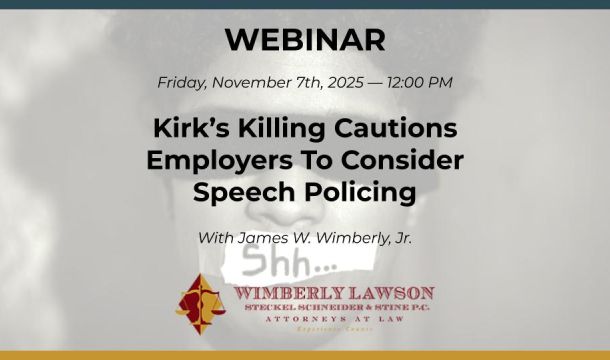EEOC Issues Updated Guidance on Avoiding Discrimination Against Transgender Employees
Last week, on the first anniversary of the U.S. Supreme Court’s decision in Bostock v. Clayton County, in which the Court held that Title VII’s prohibition on discrimination on the basis is “sex” encompasses sexual orientation and transgender status, the EEOC issued some updated guidance regarding the treatment of transgender employees in the workplace. “All people, regardless of sexual orientation and gender identity, deserve an opportunity to work in an environment free from harassment or other discrimination,” EEOC Chair Charlotte A. Burrows said.
This new guidance is considered controversial, especially by social conservatives, because of both the substance and the way that it was announced. The substance addresses things such as dress codes, bathrooms, showers, and pronouns. And the guidance was issued without a vote by the five member bipartisan EEOC panel, which currently has a 3-2 Republican majority, resulting in three very unhappy Commissioners.
Keep in mind that the publication in itself does not have the force and effect of law and is not meant to bind the public in any way. Nevertheless, this guidance tells us the position the EEOC will take in response to EEOC Charges filed by transgender employees. EEOC guidance also can influence court decisions.
What kind of guidance did the EEOC offer to us? Here are some highlights.
Dress codes:
May a covered employer require a transgender employee to dress in accordance with the employee’s sex assigned at birth?
No. Prohibiting a transgender person from dressing or presenting consistent with that person’s gender identity would constitute sex discrimination.
Bathrooms, showers, locker rooms:
Does an employer have the right to have separate, sex-segregated bathrooms, locker rooms, or showers for men and women?
Yes. Courts have long recognized that employers may have separate bathrooms, locker rooms, and showers for men and women, or may choose to have unisex or single-use bathrooms, locker rooms, and showers. The Commission has taken the position that employers may not deny an employee equal access to a bathroom, locker room, or shower that corresponds to the employee’s gender identity. In other words, if an employer has separate bathrooms, locker rooms, or showers for men and women, all men (including transgender men) should be allowed to use the men’s facilities and all women (including transgender women) should be allowed to use the women’s facilities.
Pronouns:
Could use of pronouns or names that are inconsistent with an individual’s gender identity be considered harassment?
Yes, in certain circumstances. Unlawful harassment includes unwelcome conduct that is based on gender identity. To be unlawful, the conduct must be severe or pervasive when considered together with all other unwelcome conduct based on the individual’s sex including gender identity, thereby creating a work environment that a reasonable person would consider intimidating, hostile, or offensive. In its decision in Lusardi v. Dep’t of the Army, the Commission explained that although accidental misuse of a transgender employee’s preferred name and pronouns does not violate Title VII, intentionally and repeatedly using the wrong name and pronouns to refer to a transgender employee could contribute to an unlawful hostile work environment.
Basically, the EEOC is telling employers to treat transgender employees in accordance with their gender identity, which is simply a matter of respect. However, employers should anticipate resistance from some employees to these guidelines and deal with it accordingly, or possibly face an EEOC Charge or a lawsuit.

Kathleen J. Jennings is a former principal in the Atlanta office of Wimberly, Lawson, Steckel, Schneider, & Stine, P.C. She defends employers in employment matters, such as sexual harassment, discrimination, Wage and Hour, OSHA, restrictive covenants, and other employment litigation and provides training and counseling to employers in employment matters.
Get Email Updates
Recent Content

Update of Work Authorization Immigration Status as of October 8, 2025

Workplace Investigations Largely Shut down, but Courts Remain Open during Shutdown for Now

Kirk’s Killing Cautions Employers To Consider Speech Policing

Trump Nominates Appointments to NLRB and EEOC but Policy Changes Likely to Be Delayed

DOL Launches Self-Audit Programs Designed to Help Employers Improve Compliance



